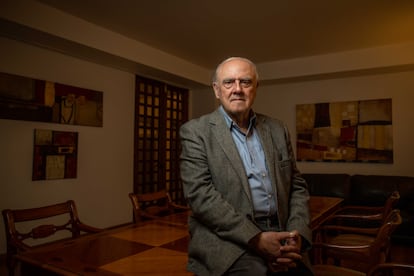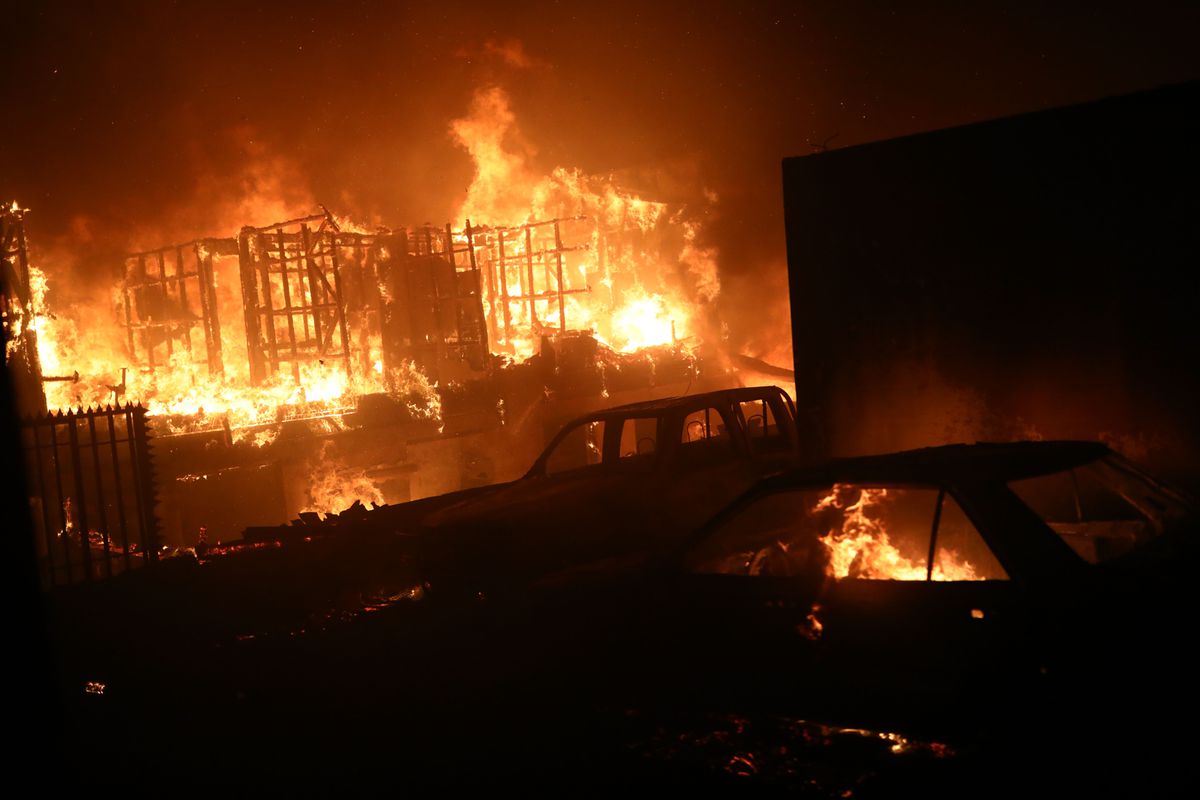Agustín Squella, at his home in Santiago de Chile. Cristian Soto Quiroz
The Chilean intellectual Agustín Squella (78 years old) -author of forceful titles, especially essays-, has plunged in the last year, like never before, directly into politics.
Since last July he has been part of the 154 conventions that draft a new Constitution, a body that is in the last stage of its work.
On July 4, the constituents will deliver the final text to President Gabriel Boric, and then the convention will cease to function.
An acute observer of Chilean society, in this interview conducted at his home in Santiago, in the eastern part of the city, Squella analyzes this last stage of the process and the moment that Chile is experiencing, less than three months after the plebiscite on September 4 which must ratify or reject the proposal.
Ask.
How do you observe people and the social mood?
Response.
People upset, social mood bad.
I see disproportionate attitudes and expressions, from side to side, all of which I tend to blame more on the pandemic than on our current political, social and economic problems.
The pandemic and its effects are insidious and no one knows yet what its neurological consequences are in people even if they are not infected with the virus.
To mention a minor, haven't you seen how loquacious we've all gotten?
We are talking a lot, very loudly, running over each other as we speak.
P.
For the academic Kathya Araujo, there was a promise of social dialogue in the constituent process that was not fulfilled.
It matches?
R.
I agree with her and I regret that things have been like this.
I still wonder if they could actually be otherwise.
I think we took too literally that the new Constitution was going to be
everyone's house
.
The only house of all in practically all countries seems to be the national soccer team.
The new Constitution, if approved, will be everyone's home, which does not mean that it is to everyone's taste or even approval.
The members of a large family who live in a common house do not therefore value it in the same way.
A democratic and open society is a nest of different and found beliefs, ideas, visions of the past, approaches to the future, ways of thinking, ways of living, interests.
How is it possible to please everyone with a constitutional text?
P.
What is your opinion on the text that refines the convention?
A.
Despite the good work done by the Harmonization Commission, the text is still overwritten.
Too many provisions, too many clauses in each provision, too many words in each clause.
That constitutional graphomania could have come from the distrust that the majority of the convention openly showed with the current and future legislators, whom he called many times, disparagingly, "constituted powers."
Something like some impure powers bordering on illegitimacy and that contrasted with the purity of the constituents and the impeccable representativeness that we attribute to ourselves.
P.
Is it a refoundational text, as the critics think, or does it collect the best of Chile, its institutions and the country's constitutional trajectory?
R.
Not refoundational at all, just transformative.
And luckily.
It was not going to be a make-up text, nor was it going to be a reform: it could only be transformative or revolutionary, and it was clearly the former.
As far as I am concerned, I do not want another Chile, but a better Chile.
The refoundational airs that inflame the spirits of some may be so inflamed that they risk setting the prairie on fire.
Q.
What are the strengths of the constituent proposal?
R.
Democratic State, with representative democracy and reinforced with forms of direct democracy that we have never known in the country;
Rule of Law;
social rights, since as Elías Díaz says, “a State of law without social rights is a State of rights”;
protection of a nature of which we are a part;
decentralization of the country.
That at the level of the provisions of the constitutional proposal, that is, of what should be, and we'll see what happens in reality.
Q.
Why?
R.
Because a Constitution is like a score that is placed in front of the current and future authorities so that they execute it with talent and fidelity, with an audience that will remain on the agenda and that will demand a good interpretation.
Q.
Is there anything in the text that worries a left liberal like you?
R.
By definition, a liberal is always dissatisfied, contrary to what happens with the always complacent neoliberals.
Although we know it perfectly, at what point did we bring to Chile the poorest and most questionable version of the liberal doctrine, that of Hayek, Friedman and Gary Becker, converting our elites happily to it?
And as for a left liberal, even more worry, since he has to deal with that part of a redemptive left of the world and that fantasizes about the new man, the ideal society, the power of the will to change everything, and a sort of perennial wisdom that would emerge spontaneously from the center of the earth and that men and women of this modernity – or postmodernity, who knows – we have not been able to listen to, much less interpret correctly.
Q.
Do you think that citizens will read the text before voting or will it be decided by other factors?
R.
I think so, although I rather hope so.
How else to vote responsibly in the plebiscite on September 4?
But we already know about our poor reading ability.
She had a cousin who said she read something every night to fall asleep, and do you know what she read?
Q.
What did your cousin read?
A.
A postage stamp that said “Correos de Chile”.
She didn't finish the word “mail” and she was already asleep.
P.
The current Constitution in Chile was drafted in 1980, during the Pinochet dictatorship, but in democracy it underwent dozens of substantial changes, such as the reforms of the socialist Lagos in the 2000s, who signed the current Magna Carta.
For you, is it still the Pinochet Constitution?
A.
Sure.
There were very important constitutional changes, but also extremely slow and always subject to the veto of a third of the votes of the defenders of the Pinochet Constitution in our National Congress.
The main reforms, of 1989 and 2005, were that, important reforms and, as for the second ones, long postponed.
It was not about new Constitutions.
It is fine to say that it is possible to do things with words, but without exaggeration.
P.
Are you going to approve the proposal in the plebiscite?
R.
I will approve.
Could I do something else if I voted favorably for most of the provisions of the constitutional proposal?
In addition, I take it for granted that the current or future Legislative Power, as well as the entire citizenry, may intervene in the defects to make the adjustments of the case later.
The law is a dynamic order, not static, changing, not fixed, and always foresees its own creation and change, establishing the rules and procedure for it.
Only extreme constitutional narcissism could explain why some think that the proposed new Constitution will be perfect and, therefore, immune to change.
P.
How is it explained that the option to change the Constitution had 78% support in October 2020 and today, according to the polls, approval and rejection are tied and a large number of undecided?
R.
It is difficult for me to understand, but Chile is characterized by saying yes to change and then getting scared when the changes arrive.
At the same time, and in this case, many who are in favor of rejecting it do not do so because they have formed a judgment on the proposal of the convention - not yet ready -, but because of unpleasant episodes that occurred during the constituent process and because of attitudes and intemperate declarations of constituents who boasted more about themselves than about the process we were in.
Q.
Who?
R.
To some extent, we were all guilty of it, again from side to side, giving more importance to who each of us was than where and what we were for.
We gave juice
, as it is said in colloquial Chilean language, and that brought with it a distance and even anger on the part of the citizenry.
Q.
Do you understand the world you are about to reject?
Is it only the right one that is in that position?
R.
It is more than the right, but to those who are for the rejection –also to those of the approval, and what to say to the undecided, the latter the most responsible of all–, I would ask them to wait until they have the final proposal ahead , duly harmonized and with its transitional rules also in sight.
We should all prepare to analyze it in family, neighborhood, work, professional, and student groups, without letting ourselves be carried away by initial impressions or by the voice of the tribe or pack to which we belong.
P.
For an intellectual like you, how has it been this year when you landed suddenly in politics?
How is politics in Chile?
R.
I have felt as if I were living someone else's life.
Do you remember what Norberto Bobbio said about politicians and intellectuals?
While the latter untie knots, the former cut them.
With my academic life taken care of, I got used to untying knots, sometimes twisting them more, and now I was in a space where they had to be cut with votes.
A negative factor in the convention was that some of the academics who came to it were able to believe that by arriving at a political space we were becoming,
ipso facto
, consummate politicians.
Q.
And Chilean politics?
How is it going?
R.
The usual, here and all over the planet.
Can there really be a new way of doing politics if this is a human activity that has to do with power, with winning it, exercising it, keeping it, increasing it, and recovering it when it has been lost?
Q.
Have you ever regretted having taken on this political adventure?
R.
No. I always found meaning in this task, whatever the result.
Look how a 78-year-old man had the opportunity to collaborate, a lot or a little, it doesn't matter, in a proposal for a new Constitution for his country.
Sure, it was a non-rational decision if you believe that rational are only the decisions we make in favor of ourselves.
Also, and to use your very word, it's about time my only adventure wasn't just betting on the horses from time to time.
P.
You are going to write a book about your own experience within the constituent body.
What cheers you up?
A.
At times I think I was able to apply to the Convention just to write the book I'm preparing.
subscribe here
to the
newsletter
of EL PAÍS México and receive all the informative keys of the current affairs of this country











/cloudfront-eu-central-1.images.arcpublishing.com/prisa/KMEYMJKESBAZBE4MRBAM4TGHIQ.jpg)



